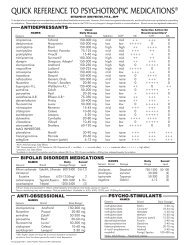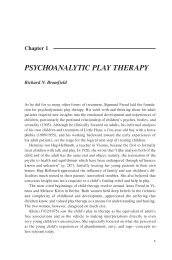IRAQ WAR CLINICIAN GUIDE
Iraq War Clinician's Guide - Network Of Care
Iraq War Clinician's Guide - Network Of Care
You also want an ePaper? Increase the reach of your titles
YUMPU automatically turns print PDFs into web optimized ePapers that Google loves.
Iraq War Clinician Guide 41 Treatment<br />
of more immediate support. When couples can be offered a safe forum for discussing, negotiating,<br />
and possibly resolving conflicts, that kind of clinical support can potentially help to reduce the<br />
intensity of the feelings that can become dangerous for a family. Even support for issues to be<br />
addressed by separating couples can be critically valuable, especially if children are involved and<br />
the parents anticipate future co-parenting.<br />
Residential rehabilitation treatment. Inpatient hospitalization could lengthen the time returning<br />
personnel are away from their families, or it could be an additional absence from the family for the<br />
veteran who has recently returned home. It is important to the ongoing support of the reuniting<br />
family that clinicians remain aware that their patient is a partner andlor parent. Family therapy<br />
sessions, in person or by phone if geographical distance is too great, can offer the family a forum<br />
for working toward meeting their goals. The potential for involving the patient's family in treatment<br />
will depend on their geographic proximity to the treatment facility. Distance can be a barrier, but<br />
the family can still be engaged through conference phone calls, or visits as can be arranged.<br />
Pharmacotherapy<br />
Pharmacologic treatment of acute stress reactions. Pharmacological treatment for acute stress<br />
reactions (within one month of the trauma) is generally - reserved for individuals who remain<br />
symptomatic after having already received brief crisis-oriented psychotherapy. This approach is in<br />
line with the deliberate attempt by military professionals to avoid medicalizing stress-related<br />
symptoms and to adhere to a strategy of immediacy, proximity, and positive expectancy.<br />
Prior to receiving medication for stress-related symptoms, the war zone survivor should have a<br />
thorough psychiatric and medical examination, with special emphasis on medical disorders that<br />
can manifest with psychiatric symptoms (e.g., subdural hematoma, hyperthyroidism), potential<br />
psychiatric disorders (e.g., acute stress disorder, depression, psychotic disorders, panic disorder),<br />
use of alcohol and substances of abuse, use of prescribed and over-the-counter medication, and<br />
possible drug allergies. It is important to assess the full range of potential psychiatric disorders, and<br />
not just PTSD, since many symptomatic soldiers will be at an age when first episodes of<br />
schizophrenia, mania, depression, and panic disorder are often seen.<br />
In some cases a clinician may need to prescribe psychotropic medications even before completing<br />
the medical or psychiatric examination. The acute use of medications may be necessary when the<br />
patient is dangerous, extremely agitated, or psychotic. In such circumstances the patient should be<br />
taken to an emergency room; short acting benzodiazepines (e.g., lorazepam) or high potency<br />
neuroleptics (e.g., Haldol) with minimal sedative, anticholinergic, and orthostatic side effects may<br />
prove effective. Atypical neuroleptics (e.g., risperidone) may also be useful for treating aggression.<br />
When a decision has been made to use medication for acute stress reactions, rational choices may<br />
include benzodiazepines, antiadrenergics, or antidepressants. Shortly after traumatic exposure, the<br />
brief prescription of benzodiazepines (4 days or less) has been shown to reduce extreme arousal<br />
and anxiety and to improve sleep. However, early and prolonged use of benzodiazepines is<br />
contraindicated, since benzodiazepine use for two weeks or longer has actually has been<br />
associated with a higher rate of subsequent PTSD.<br />
Although antiadrenergic agents including clonidine, guanfacine, prazosin, and propranolol have<br />
been recommended (primarily through open non-placebo controlled treatment trials) for the<br />
DEPARTMENT OF VETERANS AFFAIRS<br />
NATIONAL CENTER FOR PTSD




